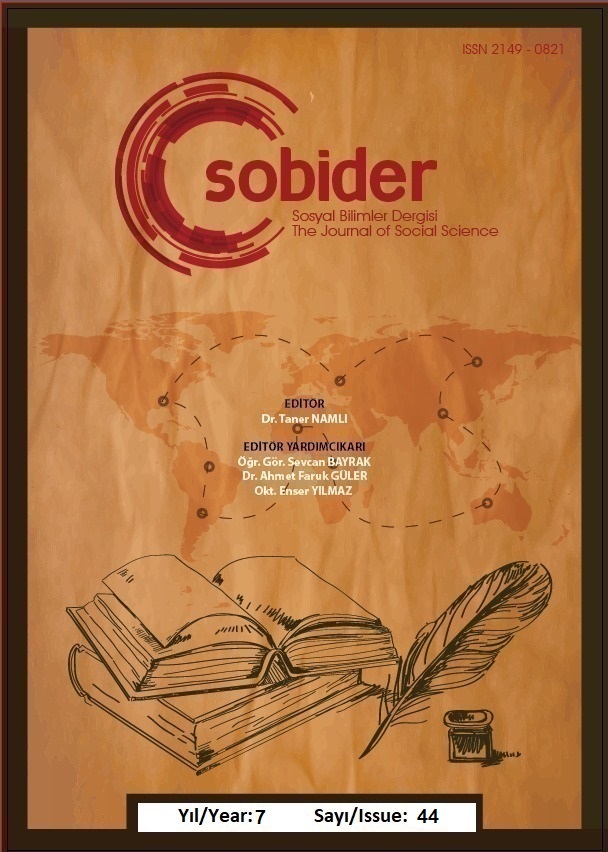Author :
Abstract
Dünyada özelleştirme uygulamaları genel itibari ile 1970’li yıllardan itibaren ortaya çıkmıştır. İlk olarak İngiltere ve Amerika’da başlayan özelleştirmeler, daha sonraları ise gelişmekte olan ülkelerde ve Doğu Avrupa ülkelerinde uygulanmaya başlanmıştır. Türkiye’de ise özelleştirme uygulamaları 1980 yılından itibaren yaygınlaşmaya başlamıştır. KİT’lerin Türkiye ekonomisinde giderek artan ekonomik, sosyal ve siyasal sorunlara neden olması, hem Türkiye ekonomisini hem de KİT’leri olumsuz olarak etkilemektedir. Türkiye’de özelleştirme politikalarının istihdam ve üretime katkısı tartışma konusu olmuştur. Bu çalışmada çeşitli tarihlerde özelleştirilen Amasya, Kayseri, Konya, Kütahya, Adapazarı, Erzurum ve Erzincan Şeker Fabrikalarında istihdam edilen kişi sayısında ve üretilen şeker miktarlarında nasıl bir değişime yol açtığı, özelleştirme öncesi ve özelleştirme sonrası üretim ve istihdam verileri ele alınarak analiz edilmiştir. Yapılan analizler neticesinde özelleştirme sonrasında bahsedilen yedi şeker fabrikasında istihdam ve üretim açısından arzu edilen olumlu bir sonuç elde edilmediği görülmüştür.
Keywords
Abstract
Privatization practices in the world have generally emerged since the 1970s. Firstly, privatizations started in the United Kingdom and the United States, and later were implemented in developing countries and Eastern European countries. The privatization process in Turkey has become widespread since 1980. SOEs in Turkey's economy growing economic, social and political problems that cause both Turkey's economy could adversely affect the SOEs. The privatization policies contribute to employment and production in Turkey has been the subject of debate. In this study, the changes in the number of people employed and the amount of sugar produced in Amasya, Kayseri, Konya, Kütahya, Adapazarı, Erzurum and Erzincan Sugar Factories which were privatized at various dates were analyzed by considering production and employment data before and after privatization. As a result of the analyzes, it was observed that the desired positive results in terms of employment and production were not obtained in the seven sugar factories after privatization.
Keywords
- Akyüz, M., Ertel, N., (1987), Ansiklopedik Ekonomi Sözlüğü, Dünya Yayınları, İstanbul.
- Bhaskar, V., Khan, M., (1995), Privatization and Eployment: A Study of the Jute Industry in Bangladesh, The American Economic Review, 85(1), s. 267-273.
- Bulut, K., (2005), Özelleştirme Politikalarının İstihdam Boyutu ve Enerji Sektörü, İŞ-Kur, Uzmanlık Tezi.
- Ceep, A., (1993), Türkiye’de Kamu İktisadi Teşebbüsleri ve Özelleştirme Sorunu, (çev. Veysel Atasoy), Ankara.
- Çetinkaya, Ö., (2001), Türkiye’de Devlet İşletmeciliği ve Özelleştirme, Ekin Yayınları, Bursa.
- Çiçek, Ö., (2016), Özelleştirme Sürecine Sendikaların Bakış Açısı: Burdur ve Uşak Şeker -İş Sendikası Örneği, HAK-İŞ Uluslararası Emek ve Toplum Dergisi, Mart, s. 130-132.
- Çiçek, Ö., Acar, O. K., (2018), Türkiye’de Şeker Fabrikalarının Özelleştirilmesi ve İstihdam Üzerine Etkileri, FSECON Uluslararası Sosyal Bilimler Bildiri Kongresi, s. 110-120.
- Demirelli, L., (2014), 2002 sonrasında Türkiye’de Özelleştirme ve Demiryolu Hizmeti, Mülkiye Dergisi, Haziran Sayısı, s.41-85.
- Eştürk, Ö., (2018), Türkiye’de Şeker Sektörünün Önemi ve Geleceği Üzerine Bir Değerlendirme, Anadolu Üniversitesi, İktisat ve İşletme Dergisi, Eskişehir, 2 (1), s. 6781.
- Gökdemir, S., (2018), Türkiye’de Özelleştirmenin İstihdam Üzerindeki Etkileri, Marmara Üniversitesi, Sosyal Bilimler Enstitüsü, İktisat Anabilim Dalı, Yayımlanmamış Yüksek Lisans Tezi, İstanbul.
- Hanke, S. (1985), Özelleştirme Teorisi (Çeviren: Fevzi Devrim), http://www.canaktan.org/ekonomi/ozellestirme/kamu-ekonomisi-genisleme/devrimozellestirme-teorisi.htm (E.T: 05.04.2019).
- Karakaya, U., (2008), Özelleşme sonrası Firma Performanslarının Fransa ve Türkiye Deneyimleri Bağlamında Karşılaştırmalı Analizi, Kocaeli Üniversitesi Sosyal Bilimler Enstitüsü Doktora Tezi.
- Karayaman, M. (2010), Osmanlı Devleti’nde Şeker Fabrikası Kurma Teşebbüsleri”, Tarih İncelemeleri Dergisi, Temmuz, s. 300-309.
- Kardeş, R., Güzel, H., (1994), Türkiye’de ve Dünyada Yaşanan Özelleştirmeler, Vakıfbank Araştırma Dizisi, No: 2.
- Kazgan, G., (2006), İktisadi Düşünce veya Politik İktisadın Evrimi, Remzi Kitapevi, İstanbul.
- Kepenek, Y., (1993), 100 Soruda Türkiye’de Kamu İktisadi Teşebbüsleri (KİT), Gerçek Yayınevi, İstanbul.
- Kilci, M., (1994), Türkiye’de Özelleştirme Uygulamaları, Ankara.
- Kostakoğlu, S. F., vd., (2016), Eskişehir Şeker Fabrikasının Özelleştirilmesine Yönelik Porter’ın Elmas Modeli Analizi, Kastamonu Üniversitesi, İİBF Dergisi, Sayı: 13, s. 5061.
- Murat, S., (1995), İstihdam Açısından Kit'ler ve Özelleştirilmeleri, Sosyal Siyaset Konferansları, 40. Kitap, İ.Ü. Yayın No. 3867.
- Seyidoğlu, H., (1992), Ekonomik Terimler Ansiklopedik Sözlük, İstanbul.
- Sezer, N., (2013), Gelişmekte Olan Ülkelerde Özelleştirme Uygulamalarının İstihdam Üzerine Etkileri: Bangladeş, Nijerya, Arjantin ve Türkiye Örnekleri, İstanbul Üniversitesi, Sosyal Bilimler Enstitüsü, Çalışma Ekonomisi ve Endüstri İlişkileri Anabilim Dalı, Doktora Tezi, İstanbul.
- Süleyman, Y., (1997), Özelleştirme, Creative Yayıncılık, Ankara.
- Temizgüney, F., (2010), Erzurum Şeker Fabrikası’nın Açılışı, Türkiyat Araştırmaları Enstitüsü Dergisi, Mart, s. 329-343.
- Tümer, E. Ö., (2004), Türkiye’de Özelleştirmenin Ücret ve İstihdam Üzerindeki Etkisi, Ankara Üniversitesi, Sosyal Bilimler Enstitüsü, Çalışma Ekonomisi ve Endüstri İlişkileri Anabilim Dalı, Yüksek Lisans Tezi.
- Yılmaz, Ç., (2017), Özelleştirme Karşıtı Mücadele ve İşçi Sınıfı Bilinci: Petkim Örneği, Ankara Üniversitesi Sbf Dergisi, Mayıs, s. 915-943.
- Taşdoğan, B., Taşdoğan, C., (2012), Türkiye Şeker Fabrikaları A.Ş.’nin Malmquist Endeksi Çerçevesinde Etkinlik Analizi, Akdeniz Üniversitesi, İİBF Dergisi, (23), s. 59-77.
- Türkiye Şeker Fabrikaları Anonim Şirketi, (2017), Sektör Raporu.
